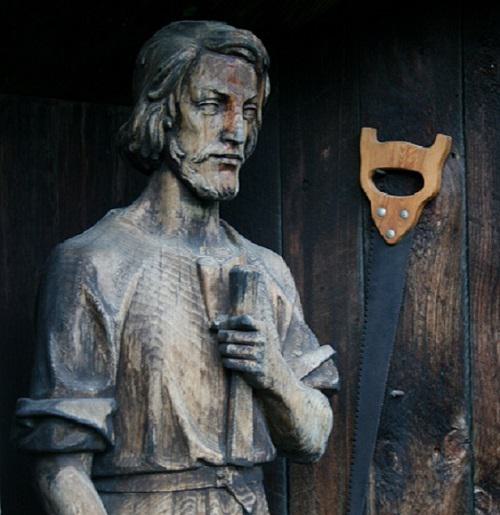The following is an excerpt from Pope Benedict XVI’s Address to the Representatives from the World of Culture, delivered at the Collège des Bernardins in Paris, September 12, 2008. It is available in its entirety here.
Thus far in our consideration of the “school of God’s service,” as Benedict describes monasticism, we have examined only its orientation towards the word—towards the “ora.” Indeed, this is the starting point that sets the direction for the entire monastic life. But our consideration would remain incomplete if we did not also at least briefly glance at the second component of monasticism, indicated by the “labora.” In the Greek world, manual labour was considered something for slaves. Only the wise man, the one who is truly free, devotes himself to the things of the spirit; he views manual labour as somehow beneath him, and leaves it to people who are not suited to this higher existence in the world of the spirit. The Jewish tradition was quite different: all the great rabbis practised at the same time some form of handcraft. Paul, who as a Rabbi and then as a preacher of the Gospel to the Gentile world was also a tent-maker and earned his living with the work of his own hands, is no exception here, but stands within the common tradition of the rabbinate. Monasticism took up this tradition; manual work is a constitutive element of Christian monasticism. In his Regula,Saint Benedict does not speak specifically about schools, although in practice, he presupposes teaching and learning, as we have seen. However, in one chapter of his Rule, he does speak explicitly about work (cf. Chap. 48). And so does Augustine, who dedicated a book of his own to monastic work. Christians, who thus continued in the tradition previously established by Judaism, must have felt further vindicated by Jesus’s saying in Saint John’s Gospel, in defence of his activity on the Sabbath: “My Father is working still, and I am working” (5:17). The Graeco-Roman world did not have a creator God; according to its vision, the highest divinity could not, as it were, dirty his hands in the business of creating matter. The “making” of the world was the work of the Demiurge, a lower deity. The Christian God is different: he, the one, real and only God, is also the Creator. God is working; he continues working in and on human history. In Christ, he enters personally into the laborious work of history. “My Father is working still, and I am working.” God himself is the Creator of the world, and creation is not yet finished. God works, ergázetai! Thus human work was now seen as a special form of human resemblance to God, as a way in which man can and may share in God’s activity as creator of the world. Monasticism involves not only a culture of the word, but also a culture of work, without which the emergence of Europe, its ethos and its influence on the world would be unthinkable. Naturally, this ethos had to include the idea that human work and shaping of history is understood as sharing in the work of the Creator, and must be evaluated in those terms. Where such evaluation is lacking, where man arrogates to himself the status of god-like creator, his shaping of the world can quickly turn into destruction of the world.
Pope Emeritus Benedict XVI served as pope from 2005 to 2013.
Keep reading! The next article in this issue is,To Toil Makes us More Human an excerpt from Laborem Excercens, Pope John Paul II's encyclical on human work.
Pope Benedict XVI served as pope from 2005 to 2013.



